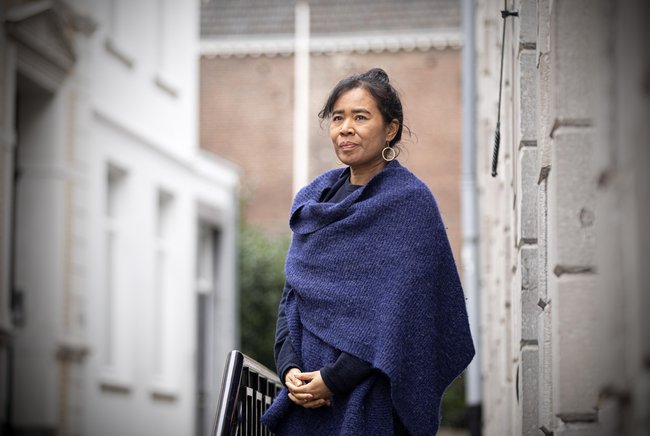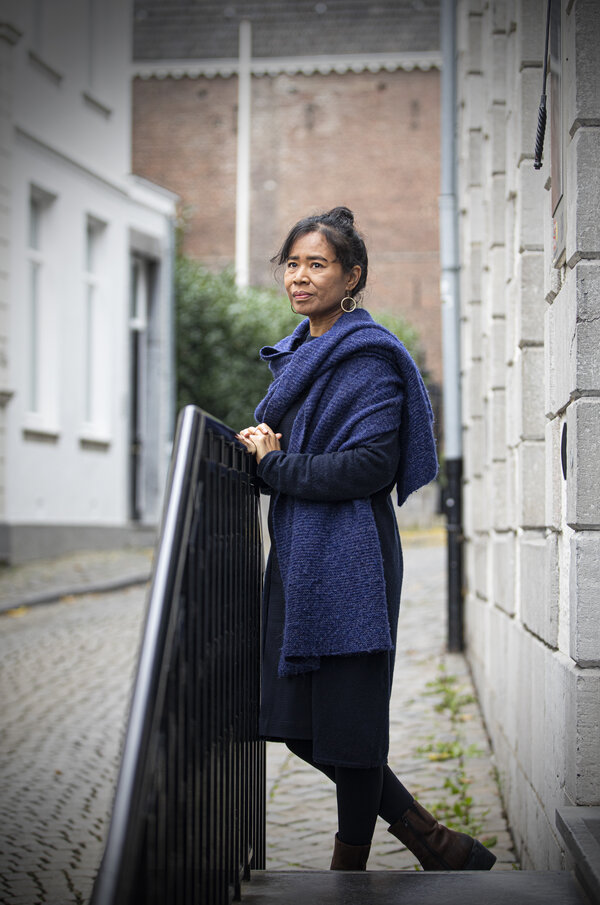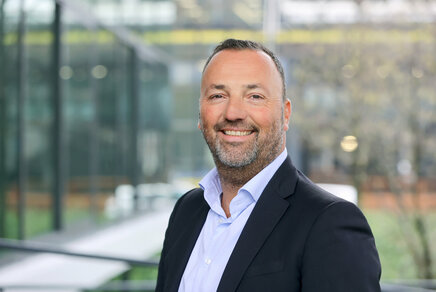“Stop making social safety an agenda item and start taking action”
In her role as ombudsman, Anna Soedira aims to improve social safety at our university. She works independently and impartially.

Anna Soedira takes up her position as our university's independent ombudsman on December 1st. She will be available to help any employee experiencing a conflict in the workplace. “It's good that this position has been introduced, but it is at least as important that it is embraced throughout the entire organization. Unless that happens, I can't work effectively.”
Even before Anna Soedira officially becomes our university's ombudsman, she has been approached by TU/e employees wishing to plan a meeting with her. “If you google me, you'll find my mediation company, so people can't be stopped from approaching me. But in principle I'm taking on cases as of December 1st.”
This picture reveals the need for an independent officer in workplace conflicts. For years now, the unions at TU/e have been calling for the appointment of an ombudsman. This wish is strong not only at our university but also throughout the Netherlands. A lawyer by training, Soedira previously fulfilled this role for three years at Maastricht University. She stresses that the appointment of an ombudsman won't be the solution to every problem. “Expectations are high, but working alone the ombudsman can't solve everything. Like others such as the confidential counselors, the ombudsman plays a role in creating social safety.”
The ombudsman is a woman
The biggest difference with a confidential counselor is that the ombudsman is independent and impartial and works mainly on labor disputes, whereas the confidential counselor focuses on complaints of inappropriate behavior. Added to which, the ombudsman's remit is broader, and includes offering solicited and unsolicited advice, pointing up issues and doing research; the ombudsman looks beyond the conflict itself to identify problems, structures and patterns within the organization that could or should be changed.
The ombudsman is entitled to information and can conduct their own independent research on the problematic situation - having gained the permission of the employee involved, of course. Subsequently, mediation between the parties may be an option.
The name ombudsman seems odd when a woman holds the office, but for Soedira the term is not gender-related. “Besides, the name ‘ombudsman’ is very familiar to many people, both here and abroad. So I call myself an ombudsman.”
Embraced by all
For Soedira it is important that her position - which is new at TU/e - has everyone's support. “An ombudsman can really help to improve social safety, being able to work independently and impartially gives us this scope. These are our anchors, but they are of little use to us if the position is not embraced by everyone. Time will tell whether this is the case here. In any event, I have been made to feel very welcome and the members of the selection board feel this position is very necessary.”
This consideration prompted her wish to meet with Vice President Nicole Ummelen, social safety portfolio holder on TU/e's Executive Board. “I wanted to know whether the board really wants an ombudsman. Is social safety something to showcase because the VSNU insists on it, or is there a genuine keenness to work on it? After talking with Nicole Ummelen I felt confident in saying ‘yes’ to the job.”

Lawyer and mediator
Soedira describes herself first and foremost as a lawyer. “It is in my DNA. In addition, I've been a mediator for ten years. This is a good combination for the position of ombudsman. I know the legal framework, what is possible and reasonable and I can easily find my way in the legal terrain.”
She herself studied and took her doctorate at Radboud University in Nijmegen, where she later worked as a lecturer and academic advisor. “So I know universities from the inside and know the issues that can arise, how things can be at times. Fortunately, I myself have never experienced any insurmountable problems, but I have seen them around me. Found myself thinking ‘There are other ways to treat each other, you know’.”
For whom?
One of the important tasks of the ombudsman is to help employees in the event of a labor dispute or the very real prospect of one. Think of problems marring cooperation or concerning dismissal, appraisal or staff management. “In principle any employee can come to me,” says Soedira. “But situations in which an employee's legal position is in jeopardy or could become so are my chief concern. Cases of inappropriate behavior, intimidation or the abuse of power should first be taken to the confidential counselors, although the dividing line is never black and white. If someone is intimidating you to such an extent that you can no longer do your work and moves are being made towards dismissal, the case can land on my plate. Then, together, we look at who will take on what, having first gained the permission of those involved, of course.”
Method
“I listen to what the people who sit down with me have to say, ask questions. If I gain persmission to set aside confidentiality, I hear both sides of the argument. Then I consider what needs to be done. Whether the parties should be brought to the table together, or whether I need to speak to more people. Perhaps the solution must be sought higher up. And often, you know, people come to me to tell their story and ask advice, but they don't want me to make their situation public. And I'm bound by confidentiality to respect their wish.”
Ombudsman at Dutch universities
Every Dutch university has been bound by the universities' collective labor agreement (CAO) since July 1st 2021 to appoint an independent ombudsman. The role includes conducting independent research and mediating in labor conflicts. In 2019 four universities launched a pilot involving an independent ombudsman: University of Twente, Erasmus University Rotterdam, TU Delft and Maastricht University. The appointments range from 12 to 20 hours a week for a period between two and three years. The pilot is ongoing.
Independence
An ombudsman must be able to work independently. And so Soedira feels it is important that this position not be assigned to an employee of the university, rather it should be an external position. “You cannot be independent and impartial if the HR department you have to discuss your employment terms with is one and the same as the HR department you need to sit down with as part of your casework.”
For this reason she has never understood the structure of internal confidential counselors at universities. “The only thing they can do is listen. Really taking action is often difficult, because confidential counselors are also employees of the university. Many universities have set up a wonderful welfare structure, but does it really work?” She understands that people will also wonder whether the ombudsman is ‘just another helpdesk’. “That's a question I can't answer yet. It is one of the first things I want to discuss when I get started. What does TU/e expect of the ombudsman?”
Vulnerable group
The most vulnerable group at all universities, says Soedira, are the doctoral candidates. “That's always been true, at all universities. Doctoral candidates are very dependent on their supervisors and an imbalance of power can occur. On occasion, universities can seem to be hosting a huge hazing ritual. It can sometimes seem perfectly normal to fail to show any respect when speaking to somebody. Often this happens because people don't know any different, and are never called up short for the adverse impact of certain behavior. After all, we recoil from having to call someone to account. And that's something I can help with: the ombudsman is someone who can contradict in the best sense of the word, someone you need to pursue the shared aim of a socially safe university.”
The ombudsman is someone who can contradict in the best sense of the word, someone you need to pursue your aim of a socially safe university
Anna Soedira, TU/e ombudsman
She mentions the case of a doctoral candidate who was in conflict with their supervisor. “If I hadn't intervened and managed to move the candidate to another supervisor, they would never have gained their doctorate. This is what makes it worthwhile for me. The same consideration as before applies here: are people obstructive as you (the ombudsman) seek solutions or are they keen to cooperate and work with you? Only then you can really achieve anything. No one likes being in a situation marred by conflict, not even the person who has the upper hand. But if you can manage to put yourself in the other person's shoes and allow the doctoral candidate to change supervisor in order to complete their doctorate, then we're getting somewhere.”
No more talking, take action
Soedira stands for action, deeds. “We have to stop talking about social safety, and get down to work. My time, and that of the university's employees, is too valuable to be establishing yet more discussion groups and charters on the topic. We simply have to take action, do something! And, of course, people come to me to talk, but that is because they want things to change, to solve something.”
She hopes very much that people get in touch with her in good time, and don't put it off until the situation is beyond hope. “Some cases have been going on for years before they are brought to me. By then it's too late for any form of mediation. ‘The ombudsman will save me’, the person thinks, but that isn't always realistic. It still happens too often, and I do understand. It is very difficult to share things that are emotionally painful and especially if they make you feel unsafe. But the earlier you come to me, the better I can help to resolve the situation.”
Time and expectations are important factors for Soedira. “Whenever you sit down with someone to discuss a case, you invariably run out of time. If I am working on a case, it can be so intensive that the one case alone can fill forty hours. But I'll only be working three days a wekk, so I'll have to divide my time. By the way, I've agreed with the board that we'll continue to discuss what is going to be necessary to fulfil this function properly at the university.”
Online benefits
At Maastricht University, Soedira had been working wholly online since the start of the corona crisis. “And I have to say, that works well. Perhaps because it is actually better for employees to be able to tell their story in this way, without being ‘seen’ entering my office.” She will be working at TU/e three days a week, and will probably be on campus two days a week.
Soedira would like to appeal to managers at our university: “The institution of ombudsman is troubled by a slightly antagonistic image, along the lines of ‘you'd better watch out for them’. But I'm not here to rap people over the knuckles. I would like us to work together, in an effective way, on social safety. This takes time, but every step counts. As such, my contribution will not be immediately evident. It may not even be evident during the two-year period of my appointment. But I hope nonetheless to make a contribution that sets us moving together in the right direction. Let's all use the institution of ombudsman to do some good.”
Downloads safety support guides staff and students
More on our strategy


![[Translate to English:] [Translate to English:]](https://assets.w3.tue.nl/w/fileadmin/_processed_/c/f/csm_BvOF_2024_0319_AEV_license_TUe_Dirk_van_Meer_-_CORE_1__c976e259a5.jpg)
